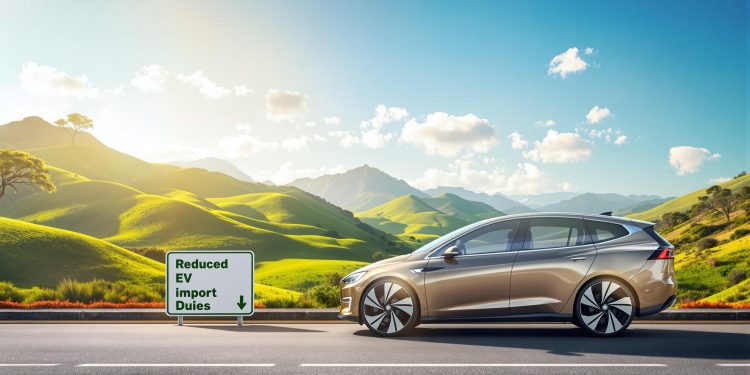Electric vehicles (EVs) in South Africa are subject to high import duties and taxes, making them more expensive than traditional gasoline cars. However, recent government changes aim to reduce these costs and encourage EV adoption. Here’s a quick breakdown:
- Current Costs: Import duties, VAT, ad valorem tax, and customs fees significantly increase EV prices.
- New Updates: The South African government has reduced EV import duties and plans further phased reductions to make EVs more affordable.
- Market Impact: Lower duties are expected to boost EV adoption, reduce the price gap with gasoline cars, and support eco-friendly transportation.
These changes reflect efforts to make EVs more accessible while addressing economic and environmental goals.
Import Duty Basics for EVs
Current Duty Rates
When importing electric vehicles (EVs), the base duty is calculated based on the vehicle’s cost, insurance, and freight (CIF) value. Some trade agreements might modify the standard rate for new EVs, depending on specific terms.
Additional Taxes and Fees
Importing EVs also comes with extra charges, including:
- Value Added Tax (VAT): This tax applies to the vehicle’s total value, which includes its purchase price and the import duty.
- Ad Valorem Tax: Calculated as a percentage of the vehicle’s value, this tax often depends on the vehicle’s classification, like whether it’s considered a luxury item.
- Customs Processing Fee: A fixed charge applied to each import declaration.
These combined costs significantly raise the overall expense of importing EVs. The next section will explain how these duties and taxes add up to determine the final cost of an imported EV.
Calculating EV Import Costs
Base Value Assessment
Start by determining the dutiable value of the vehicle. This is based on the CIF value, which includes the vehicle’s purchase price, shipping costs, and insurance expenses. Be aware that additional charges, like loading, handling, and documentation fees, might also be included. Convert all these costs into ZAR using the exchange rate on the shipment date. It’s important to keep all invoices and shipping documents handy for customs verification. Once you have the dutiable value, you can calculate the final import cost by factoring in the necessary taxes and fees.
Tax Calculations
To calculate the total import cost, you’ll need to add several taxes and fees to the CIF value. This includes import duty, VAT, and other applicable taxes, such as the ad valorem levy, along with processing fees. VAT is calculated based on the combined total of the CIF value and the import duty. The exact rates will vary depending on the vehicle’s classification and current regulations, so it’s a good idea to check the latest guidelines or consult a customs expert to ensure accuracy.
Tesla Import Possibilities in South Africa Explored Amid Ad …
sbb-itb-09752ea
Price Effects and Market Response
Let’s take a closer look at how various fees and taxes influence the EV market, building on the earlier cost breakdown.
Retail Price Impact
Taxes like import duties, VAT, and additional levies often push even the most basic electric vehicles into much higher price categories. This makes EVs less accessible to many buyers.
EV vs. Gas Car Costs
Higher import fees contribute to a noticeable price gap between electric vehicles and traditional gasoline-powered cars. While EVs can save money over time due to lower running costs, the steep upfront price makes it harder for buyers to recover their investment quickly.
Market Growth Effects
Price-sensitive buyers are often discouraged by high import duties, which slows down EV adoption. This delay also impacts the development of charging infrastructure. Meanwhile, hybrids – benefiting from lower duties – are becoming more appealing, which could further delay the transition to fully electric vehicles.
These challenges have led to growing industry calls for changes in import duties and additional support for EVs.
Changes to Import Rules
The government has adjusted its import duty rules to address concerns about high electric vehicle (EV) prices.
Updated EV Import Duties
The Department of Trade, Industry and Competition (DTIC) announced a reduction in import duties for fully electric vehicles. This move is aimed at making EVs more affordable and encouraging their adoption.
Future Adjustments
Officials have outlined plans for a gradual decrease in EV import duties. This phased approach is intended to lower costs further and promote a more competitive market for eco-friendly transportation in South Africa.
Summary
South Africa has revised import duties for electric vehicles (EVs), aiming to encourage their adoption. The Department of Trade, Industry and Competition (DTIC) recently announced a reduction in these duties, making EVs more accessible to consumers.
The updated duty structure follows a phased approach designed to improve EV competitiveness. Key changes include:
- Lower import duties for fully electric vehicles introduced by the DTIC
- A planned timeline for gradual duty reductions to promote market growth
- Additional steps aimed at improving EV affordability
These policy updates reflect South Africa’s effort to grow the EV market while addressing both economic and environmental goals. As regulations continue to evolve, EVs are expected to become more affordable, accelerating the shift toward electric mobility and supporting the local automotive industry.
Related posts
- SA EV Sales Growth 2025: Key Numbers
- Export Tax Incentives: Boosting SA Auto Exports
- EV Charging Costs in South Africa: Breakdown
- Age-Based Import Taxes for Used Cars in South Africa





